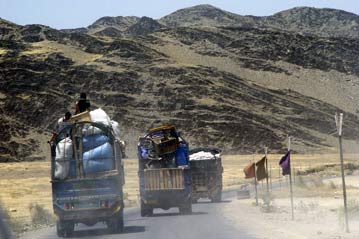UNHCR opens Afghan repatriation season
UNHCR opens Afghan repatriation season

KABUL, March 3 (UNHCR) - The UN refugee agency has resumed assisting refugees who want to return from Pakistan to Afghanistan, restarting the voluntary repatriation programme that was interrupted after the murder of a staff member last November.
In the first assisted return movement from Pakistan this year, 65 Afghan refugees left the Peshawar area on Wednesday after undergoing iris recognition tests to ensure that they were not claiming repatriation assistance for the second time. They then crossed the Khyber Pass and proceeded towards an encashment centre in Afghanistan where they will receive a cash grant to help them return to and reintegrate in their home areas.
In Islamabad, UNHCR staff have pre-registered refugees who will leave later this week.
The return movement got off to a slow start when Afghan refugees chose not to travel as scheduled on Tuesday, the Shiite holy day of Ashura. Repatriation procedures were also disrupted in Quetta when sectarian violence led to a curfew and the temporary closure of UNHCR's office. As a result, refugee families were allowed to leave Karachi for Afghanistan without taking an iris recognition test.
In all, some 400,000 refugees are expected to return this year under the UNHCR programme that has helped about 1.9 million Afghans to go home from Pakistan in the past two years.
The refugee agency suspended its repatriation programme in November after staff member Bettina Goislard was killed by gunmen in the Afghan city of Ghazni, a shooting that had followed months of increasing violence against humanitarian workers in Afghanistan.
The decision to resume repatriation came after UNHCR took additional security precautions for its staff and received assurances from the governments of both Afghanistan and Pakistan that they are combating militants who have targeted aid workers as part of a campaign against the Interim Government of Afghanistan. Control in the border area of the countries has been tightened.
This year, UNHCR will continue last year's consolidation and closure of Pakistan's camps emptied by returnees, starting this month with Shalman camp in North West Frontier province. Some 47 percent of the camp's 10,000 residents have already indicated they would like to return to Afghanistan, while the remaining refugees have opted for relocation to Kotkai camp in the same province.
In 2002, more than 1.5 million Afghans were assisted to return home from Pakistan following the removal of the Taliban government in Kabul. A further 350,000 refugees went back last year. Although the temporary suspension of UNHCR's programme coincided with the winter when few refugees return to Afghanistan, several thousand Afghans have moved back without the agency's assistance since November.
The voluntary repatriation programme is carried out under a tripartite agreement with UNHCR and the governments of Afghanistan and Pakistan that runs through 2005. It enshrines the principle of voluntary, gradual returns to ensure the numbers who go home can be absorbed in Afghanistan and not flow back into Pakistan.
Another over 670,000 Afghan refugees have returned from Iran since assisted returns began in April 2002.







